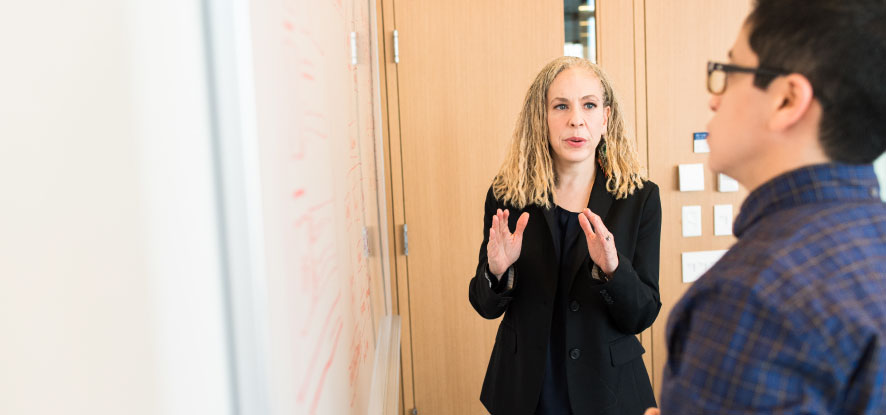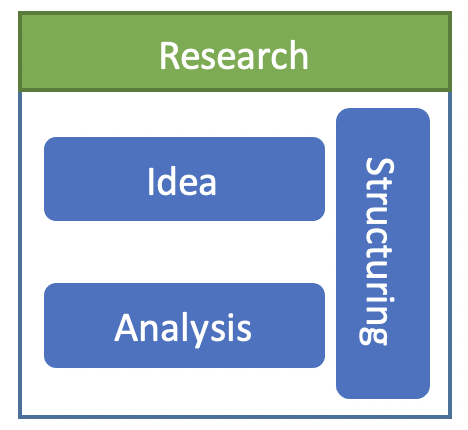Research Tips: The Key to Running an Efficient Research Team
By Donn Kim
Assistant Professor of Finance and Real Estate

Making extra time for research is not easy, especially when faced with a variety of competing priorities, and when excelling in one means less time for another. As I assume many of my colleagues also do, I cope by working late, working weekends, sacrificing family time, etc., but nothing has been easy. I’ve come to accept the limitations of my research time, and try rather to focus on how to use that time efficiently. One way to achieve efficiency in research is to run an efficient project team. Below I share my recent experience from a successful and probably most efficient research project.
1. Specialization
I see the research process as "Idea" generating, "Analysis" of theories, and "Structuring" of the paper. Accordingly, I prefer to have two or three co-authors who are specialized in each process. For most projects, I specialize in the analysis.
Sometimes, I incubate ideas or structure the paper, but I can do much more work when I’m in charge of analysis as opposed to other things; this allows me to work on more projects with efficiency.
One day, Professor Y approached me with a research idea and data. The topic was in an area in which I was interested, but had shallow insights. However, she was an expert in that area, and wanted me to develop her theory into econometrics models and analyze them—perfect for me! With her expertise in idea generation and my specialty in analysis, we drafted the paper quickly and presented it at multiple conferences. However, although the draft was ready, we felt that the paper still needed more ingredients to make it more attractive. That was the sign that we needed to bring in someone to structure the paper.
We narrowed the candidates down to J, who I’ve known for a long time, and whose writing style I knew was very persuasive and intriguing. In our first meeting with J, she brought in great wisdom, providing a different angle for our research questions. Though her input created a little extra work overall, the paper's quality increased significantly. J re-structured the paper, and we all agreed that it was good to go. I believe that specialization is the key to keeping me productive in research in my limited time. Though I mostly specialize in analysis, idea-generating and persuasive storytelling are all essential areas for efficient and effective research.
2. Trust
A research team is mostly built on trust, and even more so for a specialized team. Sometimes we fall into the temptation to think, "I did my part, and others should take care of the rest. I need to focus on my other projects." This mindset can hurt the trust of the team. Sometimes I submit papers to a journal as a corresponding author, quite a stressful process that requires a great deal of concentration to catch mistakes and customize minor details to satisfy journal requirements. But when my co-authors inform me of typos, formatting errors, unnecessary zeros in tables, and all other minor details, I know that they are the ones I can trust for future projects. Even if it is a specialized project, all should take ownership of the project and complement each other’s work.
Commitment to the project is an essential element of building trust. For this reason, I try not to re-prioritize my research projects based on importance. I’m sure I’m not the only one frustrated when a coauthor says, "I have other projects I’m working on, and will work on this after I finish them." A project that has less priority for me may be top priority for others—it could be their job market paper, needed for their promotion, etc. Instead, I try to stick to the “first-come, first-serve” approach and allocate the same amount of time to each project, regardless of its importance. If I feel that I am under-prioritized by someone else, I may be less motivated for the project. Of course, if there is time pressure for deadlines such as R&R, those can be exceptions.
 During the initial stage of my research with Y, I delivered my part as I promised,
and Y also did the same. And when J was invited, it seemed she was already occupied.
But, to my surprise, she responded to us with a rewritten manuscript in a couple of
days; I was expecting at least two weeks! My coauthors commitment motivated me to
work harder—all these helped to build trust among coauthors. Building a new network
is important, but I believe strengthening your existing network with trust is even
more important.
During the initial stage of my research with Y, I delivered my part as I promised,
and Y also did the same. And when J was invited, it seemed she was already occupied.
But, to my surprise, she responded to us with a rewritten manuscript in a couple of
days; I was expecting at least two weeks! My coauthors commitment motivated me to
work harder—all these helped to build trust among coauthors. Building a new network
is important, but I believe strengthening your existing network with trust is even
more important.
3. Leadership
Going back to my example research, this was the first project to realize the importance of leadership in research. My previous publications were out from my work during my Ph.D. study. Those projects involve my advisors, and the leadership was automatically there. However, now as an independent researcher, my projects are usually self-paced without anyone to monitor the schedule. In this example I shared, Y demonstrated outstanding leadership all through the project. Her excellence in planning and scheduling the progress of the project, and setting up regular meeting schedules with specific targets in progress, meant that we did not waste any time in meetings because we always had specific items to discuss.
Currently, I am working with Y again on two new projects. I ask her to keep playing the leadership role. Though it may be uncomfortable to give orders and time pressure to other colleagues in research projects, it is a necessary role to make an efficient team.
Conclusion
The result of specialization, trust & leadership on this project was surprising: the project progressed very quickly at a pace I never experienced before; when we submitted it, the revision request was very short; the paper quickly was accepted into one of the top real estate journals. All the authors were positively surprised by the outcome.
When I was working on this research tip piece, it was not easy. I was concerned whether I could provide something valuable to my well-established colleagues. But here I take the courage to share my humble experience of making an efficient research team. And last but not least, when am I most productive? When I have peace of mind. As we power through challenges together, I pray that God's peace may always be with you.